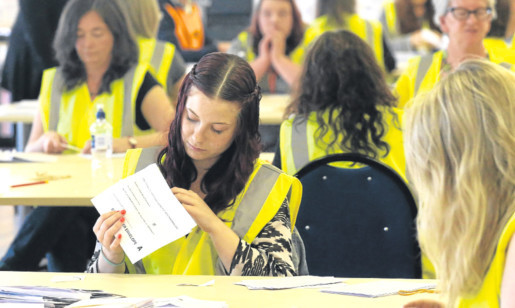
Proxy vote ‘misused by thousands’.
There were hundreds of attempts to illegally influence the outcome of Scotland’s independence referendum, a damning new probe has found.
The Sunday Post has learned “several hundred apparently fraudulent applications to register to vote were received” ahead of September’s historic vote.
The alarming disclosure is contained in a report by the officials who oversaw the voter registration process.
It comes only weeks after an investigation by the Electoral Commission found “no evidence” of widespread fraud.
The report by the Scottish Assessors Association (SAA), which represents electoral registration officers (ERO), also revealed there had been “widespread misuse and abuse” of provisions which allowed more than 6,000 people to carry out emergency proxy votes.
These were put in place to enable people who couldn’t make it to a polling station, such as the elderly and disabled, but had not arranged a proxy in advance, to still nominate someone to vote on their behalf.
One ERO even referred a “clear example of a fraudulent application” to the police but was advised that an investigation was “unlikely to be an effective use of resources”.
Police are currently probing 11 potential referendum frauds, including 10 in the Glasgow area.
The SAA report also claimed that the extra resources needed to accommodate a record turnout for the poll added an extra £700,000 to the estimated £13.7 million cost of the referendum.
The SAA is now trying to reclaim that £700,000 from the Scottish Government.
In the document, chairman Ian Milton said the referendum was “the most successful electoral event” in the history of his organisation.
But he said: “The emergency proxy provisions were extremely unsatisfactory. There was widespread misuse/abuse with electors making last-minute applications to vote by proxy where they had clearly missed the absent vote cut-off date.
“Some unsuccessful applicants made repeated applications and ERO resources were placed under undue strain to deal with the widespread misuse/abuse of the emergency proxy provisions.”
In the European elections in May, just 85 emergency proxy votes were cast across Scotland but this soared to 6,690 in the referendum.
The SAA report also revealed EROs had been inundated by queries from expat Scots conveying a “lack of understanding and a feeling of injustice” about not getting a vote.
The “extraordinary demand imposed on EROs and their staff by an extremely engaged electorate” meant offices were open 20 hours a day, seven days a week, in the final 50 days of the campaign.
Labour MSP Lewis Macdonald, who sits on Holyrood’s devolution committee, said: “This report certainly raises questions and we owe it to the 3.5 million people who did vote in the referendum to ensure that all instances of fraudulent activity are properly examined.”
Police Scotland Superintendent Jim Baird added: “Our specialist crime division is currently investigating 11 potential impersonation offences.
“These relate to members of the public arriving at a polling station to vote, only to be told that someone else had already been in and used their identity to vote.”
In the wake of the referendum, police and local councils were swamped with complaints about alleged fraud and illegality.
One related to Scottish Tory Party leader Ruth Davidson, who was quizzed by police over allegations pro-Union campaigners illegally counted postal votes in the weeks before the independence referendum ballot closed.
A staggering 100,000 people also signed an online petition demanding a re-run of the event. A poll published earlier this month revealed 34% of voters think the referendum was marred by fraud.

Enjoy the convenience of having The Sunday Post delivered as a digital ePaper straight to your smartphone, tablet or computer.
Subscribe for only £5.49 a month and enjoy all the benefits of the printed paper as a digital replica.
Subscribe